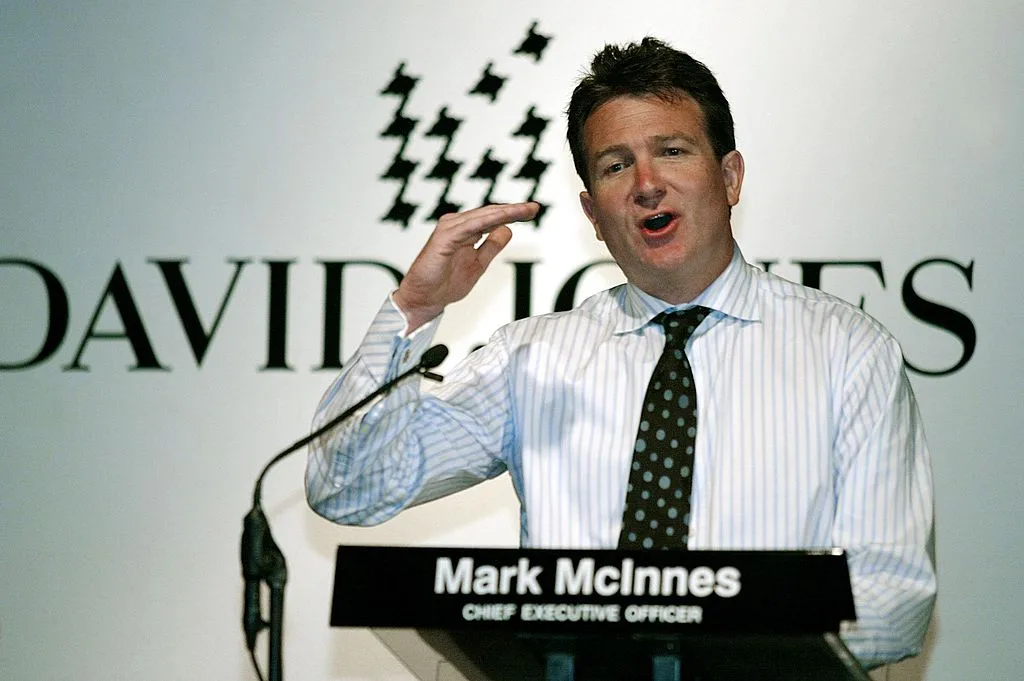She says it began, as it often does, with a sleazy comment. But it didn’t end there. On May 23, 2010, Kristy Fraser-Kirk, then a 25-year-old junior publicist with retail powerhouse David Jones, was at lunch with several of her colleagues. They were there to celebrate a big PR win for the department store, and the wine and conversation flowed. Until it flowed, for Fraser-Kirk, into a dark place, one that she says she found to be “degrading” and a “complete abuse of power”. Fraser-Kirk was seated next to the company’s CEO, Mark McInnes, a man 20 years her senior and many rungs above her on the company ladder. As part of the subsequent sexual harassment case, Fraser-Kirk made a statement of claim, in which she detailed how McInnes leered that the dessert being served tasted like “a fuck in the mouth”. Later in the evening, she said, he would slide his hand under her jumper and touch her bra strap, then try to coax her to his apartment in Bondi, implying, she believed, that they would have sex there. At an event the following month, she says McInnes attempted to kiss her twice and persisted with the invitation to his apartment.
What followed, after Fraser-Kirk complained to her HR department and asked for a review into their workplace culture, was one of the most high-profile sexual harassment cases in Australian history, one that settled out of court and led to McInnes’ resignation (complete with a golden handshake, reported to be about $2 million). Fraser-Kirk was variously labelled a champion for women and a grasping gold-digger after her lawyers’ ambit claim of $37 million. She walked away with $850,000, much of which went towards her substantial legal bills. McInnes initially admitted to behaving in a manner unbecoming of the high standard expected of a CEO, but later denied most of the allegations.
Now, 10 years on from the case, Fraser-Kirk has spoken out for the first time about what she says she endured—not just the harassment itself, but what it was like to be sidelined as the company went into damage-control mode. “At 25 years of age it was a lot to handle,” Fraser-Kirk tells marie claire exclusively from the London home she shares with her husband and son. “I think I handled myself as well as can be expected considering a lot of people wanted to write me off as a bimbo gold-digger. If that had happened to me today, I would have simply told him to fuck off. But it didn’t happen to me when I knew who I was as a woman, who understood her worth, who felt confident professionally. It happened at the beginning of my career when I was naive and just starting out.”

Fraser-Kirk is proud of her decision to speak out at the time, but the personal toll was immense. “I was attacked by the media and general public with my reputation slandered, while colleagues—who knew what was happening—watched on silently. It hurt—a lot,” she says. “I had no idea how hard speaking up would ultimately be, and the extent people would go to to belittle and shame me.
“Back then, the media and general public opinion was far less accepting of women who tried to bring attention to sexual harassment in the workplace,” she continues. “It was far easier to scapegoat and vilify the person airing the issues rather than face the issues themselves. I was dealing with people discrediting me on every level professionally and personally, at a really young age. I was scared, petrified actually, and why? I didn’t do anything wrong, he did.”
The case dominated national headlines for months. Yet a decade later, it appears Australian workplaces—particularly large corporations—have learnt few lessons from the allegations, with sexual harassment seemingly as prevalent today as it was then.
Even the ongoing #MeToo movement, which began in 2017, hasn’t seemed to have changed much. Fraser-Kirk despairs that so many Australian women are still having to put up with the same sort of violation and power play in the workplace that she says she experienced—and the solutions seem a long time coming. “I don’t think we’ve cracked a way for a person with no voice to have the confidence to stand up and report what they’re experiencing,” she says of the shielded way that sexual harassment cases are still being handled in Australia.
“Boardrooms still don’t think it can affect them, that it matters, that they can be held accountable,” she says. “We have an obligation to those starting in their careers to show the way. I believe we have a duty as women to look out for one another—not simply palm off incidents as no big deal, or ignore them and hope they go away on their own. They won’t.”
The facts would suggest it’s a fair assessment. A 2018 Australian Human Rights Commission national survey found one in three people had been sexually harassed at work in the past five years, yet only 17 per cent made a formal report or complaint. The “marked increase in the prevalence rate” compared to previous surveys prompted the Sex Discrimination Commissioner, Kate Jenkins, to launch a landmark inquiry into the issue.
The result of the inquiry was the Respect@Work report, released in January. “Australia now lags behind other countries in preventing and responding to sexual harassment,” Jenkins said of the report’s findings. “There is an urgency for change. There is the momentum for reform.”
One in three people said they were sexually harrassed at work [between 2013-2018], yet only 17 per cent made a formal report or complaint. “Australia now lags behind other countries in preventing and responding to sexual harassment,” says Jenkins
It’s been a bleak year for sexual harassment cases in Australia, with reports of unchecked and unpunished incidents everywhere from the country’s largest multinationals to the High Court, something that would dismay anyone who imagined the #MeToo movement might have gone some way to shifting attitudes and practices. In reality, many powerful men facing serious claims of misconduct are getting away with nothing more than a slap on the wrist.
In June, executives at finance giant AMP set off a firestorm of fury among female staff and its own shareholders by promoting a senior manager after he had been found to have sexually harassed a female colleague in 2017. Former AMP executive Julia Szlakowski was subjected to a number of unacceptable comments and demands from her boss Boe Pahari. Some of her allegations against him include: pressuring her to extend a work trip to London; insisting he buy her clothes; forcing her to dance on a table with him at a nightclub and then separating her from her colleagues to take her to a private club with his friends; and barraging her with texts and WhatsApp messages that he asked her to keep secret. She also says he demanded to know the age of the oldest man she had dated (Pahari was about 20 years her senior), and told her that refusing his gifts was the same as treating him like he had a “limp dick”.
But after an internal investigation, Pahari was given what could only be described as a telling off and a paltry $500,000 reduction of his $2 million annual bonus. Szlakowski was reportedly awarded the same in a settlement amount but left the company in 2018. And then in June this year, in a final insult, Pahari was promoted to chief executive of AMP Capital, with other execs at the company claiming Pahari had “learnt from the matter” and that his harassment of Szlakowski was “low level” and a “one-off event”.
Employees at AMP thought otherwise, as did AMP shareholders, who began to pile on the pressure for Pahari’s promotion to be revoked. But the company doubled down, with AMP Capital chairman John Fraser saying plainly that Pahari was promoted because he “made a lot of money” for the company.
Reluctant to weigh in but refusing to stay silent while her harasser was rewarded, Szlakowski released a statement through her lawyer. “AMP has two choices: it can continue to downplay a credible sexual harassment complaint, which impugns all survivors, or take action to bring about lasting and meaningful change,” it read.

In the end, two of AMP’s board members, including Fraser, stepped down from their leadership positions and Pahari returned to his original role. He issued a statement saying that he deeply regretted the events and said he apologised to Szlakowski (she denies there was an apology).
But the problem seems far from solved. A second complainant—this time anonymous due to a non-disclosure agreement—came forward shortly afterwards, alleging she had suffered “sustained sexual harassment” at the hands of not one but two senior managers at the company, one of whom was then repeatedly promoted. “My time at AMP has destroyed my life,” she said in a statement read out under parliamentary privilege by Labor senator Deborah O’Neill in August. “The perpetrators, including those who swept me under the rug, have gone on to thrive”.
Then there was the High Court’s former Justice Dyson Heydon, who was found in an internal High Court inquiry to have sexually harassed six young women who worked for him over a period of a decade—going so far, it’s alleged, to attempt to kiss them and putting his hands down one woman’s pants—while warnings about his behaviour went unheeded.
Several more alleged victims came forward to reveal that they were terrified about speaking up at the time. Canberra lawyer Noor Blumer said she was worried about being labelled a “dobber” if she reported her account of Dyson groping her under the table at a work event, and Canberra Liberal MLA Elizabeth Lee said she was paralysed with a sick fear when Heydon tried to lure her to a hotel room. “How do I get myself out of this situation without causing a scene?” is what she said raced through her mind at the time. “Nice girls don’t cause scenes. Nice girls don’t create a fuss.”
At this stage, no charges have been laid against Heydon, who stepped down from the bench in 2013, and he retains his Companion Order of Australia honour. Heydon denied any allegation of predatory behaviour or breach of the law.
As it stands today, the battle has two main fronts. One is that what constitutes sexual harassment and how it affects its victims still doesn’t seem to be broadly registering. “Even the word ‘sexual’ is problematic,” says Fraser-Kirk. “It’s not necessarily always about sexual comments—it’s about the manipulation of power.”
The other front is that, overwhelmingly, sexual harassment is still treated as a problem only once a victim speaks up. While #MeToo felt like a watershed moment in a broad sense, too many men who sit at the top of powerful organisations still see sexual harassment as something to be downplayed and minimised rather than stopped at its source. “Too often, little is done by way of prevention,” says Mia Pantechis, a lawyer with Maurice Blackburn Lawyers who worked on Szlakowski’s case. “Instead of opting for fairness and transparency when complaints are made, organisations try to protect their reputation by minimising the offending conduct, and that compounds the trauma of the victims.”
None of this surprises Fraser-Kirk. “It’s funny how more resources and efforts are only put towards understanding an issue when a brand realises that cultural behaviour like this can hurt their bottom lines and damage their reputations,” she says. “[Any change] has to start with an understanding of equality, the understanding of discrimination and how it can play out in the workplace. You can have the best HR team in the world, but if that precedent isn’t set at the top then you’re wasting your time.”
The idea that change needs to come from the top sounds obvious, but the reality is different, as Jenkins outlined in the Respect@Work report. That found that the Sex Discrimination Act 1984—once a groundbreaking piece of legislation that put Australia ahead of other countries in regards to workplace equality—falls woefully short by today’s standards, because it still puts the onus on women to initiate complaints, rather than workplaces to prevent incidents in the first place.
People on the receiving end of harassment must step forward and approach their employers, “often in the face of the media spotlight, through a slow, adversarial legal system, at high financial and reputational cost, with serious mental health impacts and career consequences, and often resulting in no or inadequate financial compensation,” Jenkins says.
Some men seem to be getting it. In September, a group of 230 corporate leaders under the banner Male Champions of Change (MCC) put out a comprehensive report, Disrupting the System. Among the recommendations is a call to stop quietly removing perpetrators with an inflated payout after sexual harassment is found to have occurred, something that would have seemed radical in Fraser-Kirk’s time. Instead, they want Australian CEOs and boards to be proactive about prevention, and put the health and wellbeing of their workforce above profit. “If you think it’s something that can just be treated as a small workplace grievance, you need to think again,” said MCC founder Elizabeth Broderick.
“These issues require the attention of the most senior leaders in organisations, and those that fail to heed that message will actually find that there is a level of scrutiny on them that they may not have seen in the past.”
Fraser-Kirk says she would love to see the day come when sexual harassment is treated for what it is: a workplace health and safety issue that marginalises women, stifles their ability to progress and rewards powerful men.
Today, she is a manager herself, and takes every opportunity she can to talk to the women who work for her about their rights, in the hope it can give them some tools to protect themselves. “It’s the part of my job I love the most,” she says. “Something I take very seriously with my staff—male and female—is that they have a sense of empowerment. If they’ve been in an uncomfortable situation, the first thing I do is listen, and try to understand what’s making them uncomfortable. We need to bring some basic empathy back into the workplace.”
What advice would she give to her 25-year-old self? “Stay fearless. With age you realise that it doesn’t matter what complete strangers think of you; you are accountable to yourself and to the people that matter and, in this instance, the things that matter to you. And what mattered to me was that I called out the boys’ club once and for all. I knew one day people would see that this is important, that it matters and that it was time for change.”
Kristy Fraser-Kirk on the sexual harassment case that changed her life
marie claire: In 2010, it was more challenging for women to speak up against sexual harassment and assault. What was it like for you?
Kristy Fraser-Kirk: Well, you need to remember that me speaking out was actually me approaching David Jones senior management asking for them to review internal cultures and behaviours. I thought it was a very normal and reasonable request considering my circumstances. That in itself wasn’t scary at all, what was difficult was standing in my living room watching a live stream of the David Jones board announcing Mark McInnes’ immediate departure without having ever notified me of their intent to do so. That was when I realised change wasn’t going to be easy, and support looked like the furthest thing I was going to get.
MC: You had to deal with an incredible amount of media scrutiny. How did that feel?
KFK: The way I was portrayed was such a cliché. Girl sues, let’s discredit her on every level. Oh, and let’s also call her out on being a gold-digger.
MC: Why did you settle the case rather than going to court?
KFK: Because I won, because he apologised, because litigation is hard, because it’s expensive and I had given it everything I had.
MC: If you could say anything to Mark McInnes, what would it be?
KFK: Mark has publicly and personally apologised for his behaviour. He fucked up and paid the price for it. I wholeheartedly accept his apology. Truth is, I would walk into a boardroom with him and talk about what happened if I felt he wanted to be part of the solution. That would be a pretty powerful message, one that lets the world know that one side can’t do all the heavy lifting.
MC: What do you hope other women can learn from what you went through?
KFK: If we want to see change, we have to be a part of that change. We actually can’t stand on the sidelines anymore, it’s simply not an option for us—today and for generations to come.
MC: How do you feel when you look back on what happened to you?
KFK: Proud. It serves as a constant reminder to ensure that I do my part today as a manager in ensuring that my team members work in a safe, trusting and respectful environment.
This article originally appeared in marie claire Australia’s December 2020 issue.










